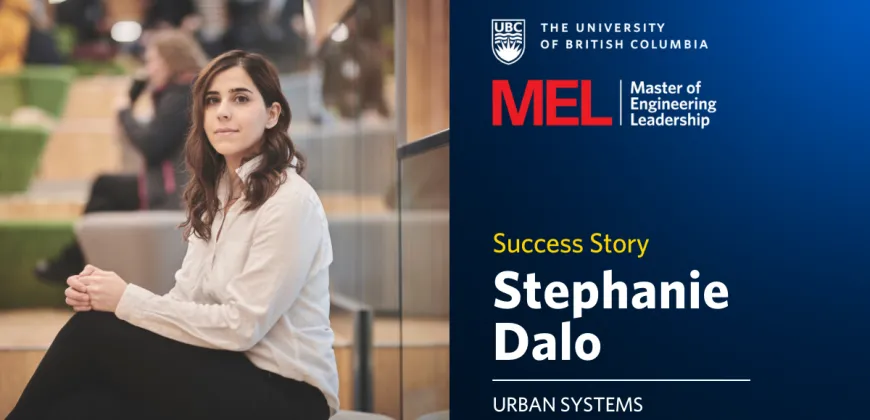Success Story: Stephanie Dalo
The MEL in Urban Systems's unique interdisciplinary education made the program very appealing to Stephanie Dalo, currently a sustainable design engineer at Vancouver’s DIALOG, an interdisciplinary firm of architects, urban planners, interior designers and structural, mechanical and electrical engineers.

Organizations focused on urban infrastructure design and management are challenged to find the multidisciplinary professionals they need – professionals who have both domain expertise and the project management, communication and leadership skills to successfully guide teams and oversee complex projects.
The UBC Master of Engineering Leadership (MEL) in Urban Systems was designed to address this requirement by combining graduate courses in engineering and urban planning from the UBC Faculty of Applied Science and the School of Community and Regional Planning with courses on business and leadership through UBC Sauder’s Robert H. Lee Graduate School.
This unique interdisciplinary education made the program very appealing to Stephanie Dalo, currently a sustainable design engineer at Vancouver’s DIALOG, an interdisciplinary firm of architects, urban planners, interior designers and structural, mechanical and electrical engineers. Her multifaceted role sees her working on projects in the residential, commercial mixed-use and health-care sectors, looking for ways to reduce carbon emissions through economically and environmentally sustainable solutions.
“I help our clients understand how sustainability goals fit into their project and what needs to be done to achieve them,” she says. “Some of that involves identifying all the people we need to pull together to explore the issue, creating a framework for making decisions and then facilitating that discussion.”
Stephanie came to the MEL with eight years of experience as a structural engineer for AECOM. She says that early on in her career she aimed to incorporate principles of resilience and sustainability into her work and to consider the larger issues behind project decisions. Her desire to make more of a difference led her to the MEL degree.
“I recognized that achieving sustainability goals is more likely when you can make the business case for them,” she says, “and I thought this program, with its combination of business, engineering and planning courses, would give me those skills.”
An integrated understanding of urban infrastructure systems
Students in the program deepen their knowledge of the complex connections and interdependencies in our urban infrastructure systems and learn how to consider the many perspectives that support strategic decision-making in this field. This is achieved through courses on urban systems planning, infrastructure asset management, urban systems engineering, urban systems and society, and urban systems project delivery and economics. Students also take two electives of their choice.
Stephanie says that the engineering and urban planning courses enabled students to appreciate the many “moving parts” that inform design and engineering decisions. Of particular value, she says, is that the program brings together professionals with backgrounds in both engineering, architecture and urban planning, who then collaborate throughout the year on group projects.
“It can be easy to get pigeonholed into certain kinds of work, certain ways of thinking,” she says.
“The technical courses were very good at encouraging us to see the interconnects and overlaps in how systems are connected. When you understand both the individual parts and the whole, you can design better and more sustainable projects.”
Strong leadership skills
Leading complex projects and managing interdisciplinary teams requires skills in project management, communication, change management and leadership.
Students in the MEL in Urban Systems learn these skills through business and leadership courses taught through UBC Sauder’s Robert H. Lee Graduate School. They take classes on organizational leadership, strategy and innovation, and sustainability and leadership.
An intense four-week business boot camp introduces students to six core business competencies, from accounting and contract management to business case development, and students can also take an additional business course of their choosing.
Case studies, class discussions and group projects enable students to strengthen their skills in communication, collaboration, leadership and group dynamics.
“The key principles I learned in these classes are now part of my day-to-day thinking,” says Stephanie. “It’s everything from effective communication strategies for managing interpersonal conflicts to successful change management processes and thinking about disruptive innovation as a way of opening up new markets.”
Above all, Stephanie says the program helped students to become far more than capable managers – it equipped them to become effective leaders.
“You need to learn leadership skills, and not all managers are leaders,” she says.
“As a leader, you need to care about leading others and to know how to facilitate effective communication within groups of people who may have profound differences of opinion. This program offers tools for engaging people and sharing information so that they can understand the ‘why’ behind decisions.”
The skills to make a difference
The challenges facing our cities are acute.
Addressing the issues of aging infrastructure, growing urban populations, limited natural resources and economic constraints requires professionals who are able to lead experts across a range of disciplines.
It requires, in the words of Jordi Honey-Roses, a former instructor in the Urban Systems program, professionals with “the ability to think beyond their own discipline, enabling them to be more confident taking leadership roles in organizations and balancing different perspectives and priorities as they work to create more environmentally sustainable, just and equitable cities.”
Graduates of the MEL in Urban Systems, like Stephanie Dalo, are able to think holistically and strategically, to lead diverse teams and consider solutions from multiple perspectives.
“The balanced technical and business skill sets I acquired through the MEL have enabled me to be a key player at early stages of projects and to connect all the different groups and silos,” she says. “We’re not quite there as a society yet, but I do think that we will one day get to the point where we won’t need a ‘sustainability specialist’ – it will just be how we do things, and we’ll expect all projects to be grounded in this perspective.”
